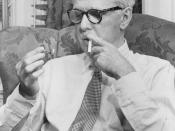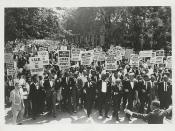A Change of Character By: Darryl F There is always more to an individual than his or her outer appearance and behavior. Sometimes what is thought to be very ordinary, or uncommon, may very well be deeper and more vicious than just having a drink or smoking a cigarette. Whether it is a plot to seek out riches, or even a scheme to eliminate another individual, usually the person is led by his or her alter ego. Such is the case in James Thurber?s short story ?The Catbird Seat,? which is a portrayal of a man deliberately trying to ?rub out? (207) someone due to her threat to him and to the firm. Mr. Erwin Martin, the timid and impeccable employee for F & S, experiences extremely dramatic character transformations due to the superfluous antagonistic attitudes of his co-worker, Mrs. Ulgine Barrows. Desperate times call for desperate measures.
Furthermore, Mr. Martin is not merely the nerdy, precise man he is perceived as.
Mr. Martin has been with F & S now for near twenty-two years. He is the head of the filing department and is very well respected. Mr. Fitweiler, Martin?s boss at F & S, once said, ?Man is fallible but Martin isn?t? (207). He follows a very routine life; however, it is so routine that it is unusual. It seems like Mr. Martin, as infallible as he is, is merely ?setting us up? for the other sides of him. Appearance is just an image. He seems to be the most vulnerable and caring man but apparently not. Would such a man deliberately try to ?rub out? another person? Or even worse, plot out a murder? Desperate times call for desperate measures. It all begins in ?the halls of F & S on March 7, 1941? (207). That was when he first hears her quaking voice, and it has been infecting him with hate ever since. ?The finger was on his beloved department. Her pickaxe was on the upswing? (209). Fearing the downfall of his company, department, and himself, Mr. Martin has to act quickly to ?rub out? Mrs. Barrows.
The slow destruction of F & S begins close to two years ago. ?Mrs. Barrows had met Mr. Fitweiler at a party? (208). It is very well possible that the cunning Mrs. Barrows had seduced her boss; otherwise she would not have been given the job and especially be his special advisor. On a regular basis, Mrs. Barrows intentionally patronizes Mr. Martin with nasty comments such as, ?Are you tearing up the tea patch? . . Are you sitting in the catbird seat?? (208) Mr. Martin can not take the downfall of the company any longer.
After a week of long precarious planning, Mr. Martin has figured out how to ?rub out? Mrs. Barrows. The concept of Mr. Martin?s plot against another must mean he is desperate. By having been repressed for quite some time, Mr. Martin?s alter ego slowly starts to seep out of his pores. Before he even leaves to her apartment, the nerdy little man transforms into a criminal mind. Having plotted her murder, everything seemed to be perfect for Mr. Martin. He reaches her apartment that night ?eighteen minutes after nine?; however, ?Mrs. Barrows seemed larger than he had thought? (210). He searches for some foreign objects that will be capable of doing enough damage without having to struggle. Immediately the murder idea would not work; his nerves were kicking in. Transformed into ?criminal mind mode?, Mr. Martin realizes that he is not capable of murdering Mrs. Barrows. After knocking over a small brass jar and some stamps, Mr. Martin -if that is still his name- is forced to explore inside of himself for a new approach to ?rub out? Mrs. Barrows.
This new man emerges from Mr. Martin through pure evil. ?I drink and smoke all the time?. He has figured out another plan. ?I?ll be coked to the gills when I bump that old buzzard off? (211). This transformation is completely opposite of the caring respectful side of Mr. Martin; however, not dangerous enough for the criminal master mind. This new Mr. Martin is only in search to destroy Mrs. Barrows? reputation and credibility. With the assumption that Mrs. Barrows will report his threats to their boss, he says and does things that are totally on the contrary to ?the real? Mr. Martin?s personality. When he feels that he has accomplished his job, he walks to the door and says with enthusiasm, ?I?m sitting in the catbird seat?(211). He sticks his tongue out at her and leaves. However, Mr. Martin can never be the same man again.
Mr. Martin, fearing his own demise, consciously or sub-consciously, experiences his own character changes. His alter egos take over and from a criminal mastermind to a very evil man, Mr. Martin experiences a permanent change in character. Although he is not likely be forced into such a dramatic character transformation again, Mr. Martin will forever know what he is truly capable of doing. Whether or not Mr. Martin has felt such changes in character before are unknown; however, there is always more to an individual than what is portrayed. Even after Mrs. Barrows is terminated from F & S, Mr. Martin is still feeling his own transformation of character. ?Wearing a look of studious concen-tration?(213) when he enters his office gives us the sign that Mr. Martin is a changed man.




